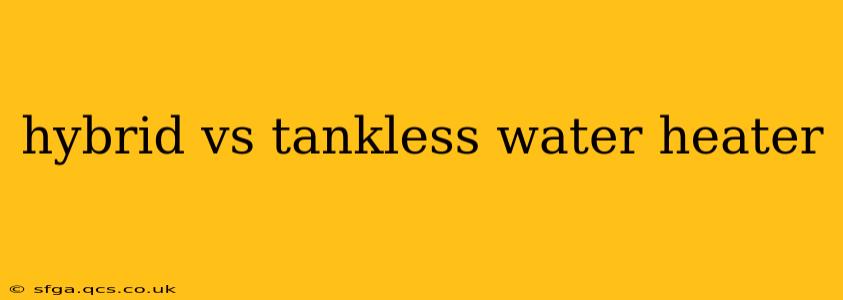Choosing between a hybrid water heater and a tankless water heater can feel overwhelming. Both offer energy efficiency compared to traditional tank water heaters, but they achieve this in different ways, catering to different needs and lifestyles. This comprehensive guide will delve into the key differences, helping you make an informed decision for your home.
What is a Hybrid Water Heater?
A hybrid water heater, also known as a heat pump water heater, uses electricity to transfer heat from the surrounding air into the water tank. This process is significantly more efficient than traditional electric water heaters that directly heat the water using resistance heating elements. Think of it like a refrigerator working in reverse – instead of removing heat, it adds it to the water. Hybrid water heaters still have a storage tank, but they rely on this heat pump technology for most of their heating.
Advantages of Hybrid Water Heaters:
- High Energy Efficiency: They boast significantly higher Energy Factor (EF) ratings than standard electric water heaters, leading to lower energy bills.
- Lower Operating Costs: The higher efficiency directly translates into substantial savings over the lifespan of the appliance.
- Environmentally Friendly: Reduced energy consumption contributes to a smaller carbon footprint.
- Relatively Low Maintenance: Similar maintenance requirements to standard tank water heaters.
Disadvantages of Hybrid Water Heaters:
- Higher Initial Cost: The upfront investment is typically higher than for a standard electric or gas water heater.
- Ambient Temperature Dependence: Efficiency decreases in colder climates as the heat pump has to work harder to extract heat from the surrounding air.
- Larger Footprint: They generally require more space than standard electric water heaters.
- Potential for Freezing in Unheated Spaces: Must be installed in a space above freezing.
What is a Tankless Water Heater?
A tankless water heater, also known as an on-demand water heater, heats water only when you need it. There's no storage tank; instead, cold water flows through a heating element (electric or gas) and is heated instantly before dispensing.
Advantages of Tankless Water Heaters:
- Unlimited Hot Water: You'll never run out of hot water, regardless of how many showers or appliances are running simultaneously.
- Energy Efficiency (potentially): While not always more efficient than a hybrid, they can be more efficient than standard tank heaters, especially in homes with moderate hot water usage.
- Long Lifespan: With proper maintenance, they can last for 20 years or more.
- Space Saving: Their compact size makes them ideal for smaller homes or utility closets.
Disadvantages of Tankless Water Heaters:
- Higher Initial Cost: Similar to hybrid systems, the upfront investment is higher than for a standard tank heater.
- Higher Installation Costs: Installation can be more complex and expensive, particularly for gas-powered models.
- Potential for Reduced Flow Rate: Some tankless units may not provide the same high flow rate as a tank water heater, especially in older homes with smaller diameter plumbing.
- Requires Consistent Electrical or Gas Supply: A power outage or gas interruption will render the unit unusable.
Hybrid vs. Tankless: Which is More Energy Efficient?
This is a complex question with no single answer. Hybrid water heaters generally have higher energy efficiency ratings than tankless water heaters, especially in milder climates. However, a tankless water heater's energy efficiency can be comparable or even superior to a hybrid in homes with low to moderate hot water demands because it only heats water when needed. The ideal choice depends heavily on your household's hot water usage patterns and climate.
What are the Installation Requirements for Each Type?
Both hybrid and tankless water heaters require professional installation. Hybrids need adequate ventilation and space around the unit, while tankless heaters require appropriate venting (for gas models) and sufficient water pressure and flow rate. Consult with a qualified plumber or HVAC technician to determine the feasibility of installation in your home.
Which Type is Best for a Large Family?
For a large family with high hot water demands, a tankless water heater is often the better option due to its unlimited hot water supply. However, ensure you choose a unit with a high enough flow rate to handle the demand.
Which is Better for a Small Apartment?
A tankless water heater is often the better choice for small apartments because of its compact size and lack of a bulky storage tank.
How Much Does Each Type Cost?
The cost of both hybrid and tankless water heaters varies greatly depending on the brand, capacity, fuel type, and installation costs. Expect to pay significantly more upfront for either option compared to a standard tank water heater. However, the long-term savings on energy bills can offset the higher initial investment over time.
Ultimately, the best choice between a hybrid and tankless water heater depends on your individual circumstances, budget, and hot water needs. Consulting with a qualified plumber or HVAC technician is recommended to determine the most suitable option for your home. They can assess your hot water usage, evaluate your home's plumbing system, and recommend the best type of water heater to meet your specific needs and budget.
